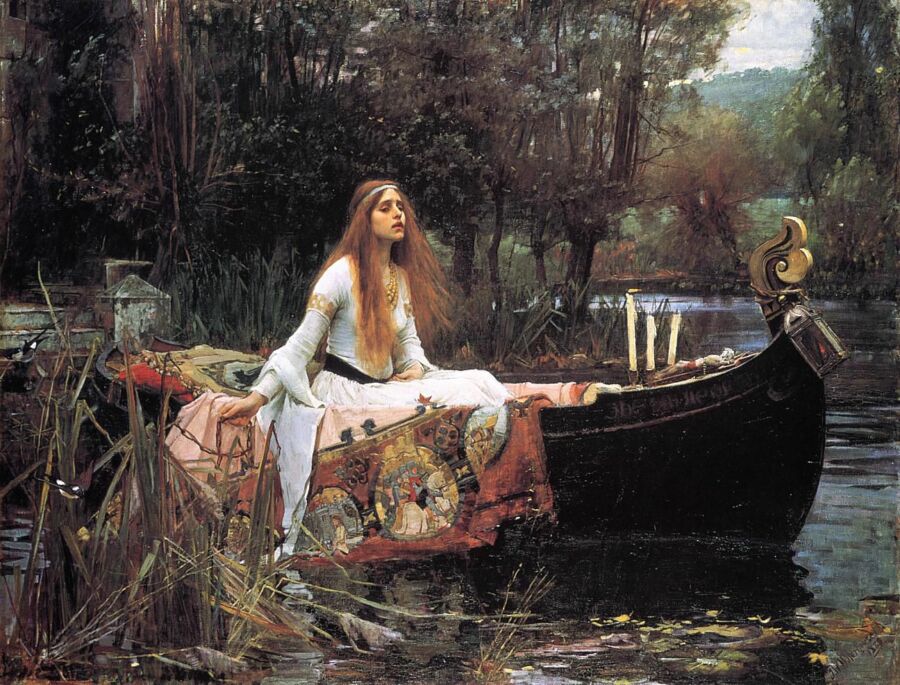
As Europe begins opening as much as vacationers once more, it’s extra thrilling than ever to consider the cultural treasures that await. For me, one of many nice joys of journey is having in-person encounters with nice artwork — which I’ve collected in a e book referred to as Europe’s Prime 100 Masterpieces. Right here’s considered one of my favorites:
This lady’s haunting face makes it clear immediately that — regardless of the splendid great thing about this portray — it doesn’t inform a contented story. The Girl of Shalott is aware of she’s floating down a river to her doom.
The English artist John William Waterhouse depicts the dramatic climax of a legendary story. The Girl of Shalott had spent her complete life shut up in a citadel close to King Arthur’s Camelot, forbidden to even look exterior, upon ache of loss of life. She may solely observe the world not directly by the reflection in her mirror. However sooner or later, the good-looking knight Lancelot rode by. She was so smitten that she broke the principles and seemed instantly at him. Now she’s adopted his tracks and boarded a ship, releasing the mooring chain, as she units off into the unknown to seek out her beloved, no matter the price.
The riverside panorama — the reeds, the inky water, the darkening environment, even birds in flight — evokes the melancholy great thing about the second. Ms. Shalott burns brightly, her white robe and purple hair radiating from the darkish background. Waterhouse targeted on evocative particulars, just like the Girl’s wispy hair, pearl necklace, evenly rumpled gown, and cupped hand. For the Girl’s face, he painted his personal spouse. The colours — reds, greens, and blues — are brilliant, clear, and luminous, glowing like stained-glass home windows.
The entire scene appears to be like medieval, but it was painted throughout an Industrial Age when Britain was main the world in new applied sciences like electrical energy and trains. Whereas Victorian Britain sped ahead, its artists seemed to the previous. Waterhouse was impressed by a gaggle of British artists referred to as the “Pre-Raphaelite Brotherhood,” who reveled in portray medieval damsels and legendary lovers with heartbreaking magnificence.
The Pre-Raphaelites hated overacting. So — even within the face of nice tragedy, excessive passions, and ethical dilemmas — this Girl barely raises an eyebrow. However her environment converse volumes. Evening is falling, foreshadowing her darkish future. The primary leaf of autumn has fallen, touchdown close to her thigh. She brings the intense tapestry she wove in captivity, with scenes of the comforting world of phantasm she as soon as knew. Now she’s guided solely by a dim lantern on the prow, a small crucifix to fortify her religion, and three fragile candles — solely considered one of which nonetheless burns.
Victorians of all ages knew this Romantic legend (which was additionally a best-selling poem by Tennyson). Everybody may learn their very own which means into the portray: The Girl has chosen to depart her safe-but-deluded existence to pursue reality. She’s following her coronary heart, regardless of the hazards. She’s taking the chance to seek out intimacy, love, and intercourse even on the expense of shedding herself within the course of. The expression on her face exhibits a mixture of worry, hope, vulnerability, and a realization that — no matter comes — that is her future.
She lets the chain go. Then, “like some daring seer in a trance,” wrote Tennyson, she goes “down the river’s dim expanse.” Within the legend, the Girl of Shalott’s boat headed downstream and washed ashore at Camelot, the place Lancelot noticed it and mourned for her. She had succumbed to the curse of seeing the world as it’s.
